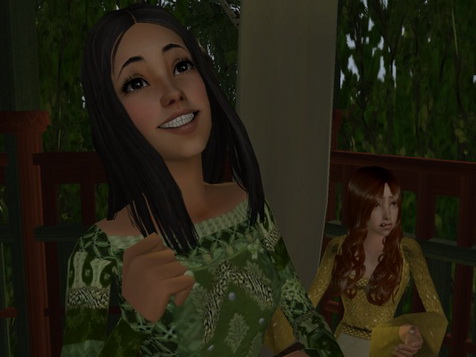
“‘I dream in my mind I embrace and I kiss my lord,’” Gwynn cried rapturously, louder than ever, for she had reached her favorite part of the poem. “‘And on his knees lay my hands and my head, as long ago, in days gone by, I sat me there.’”

Her sister snickered.
“Silence!” she snapped.
“As if you ever sat in a boy’s lap before!”
“It is a poem,” Gwynn said scornfully. “It is not about me.”
“No, but you wish it were! What a ninny!”

Gwynn ignored her and resumed with a heartbreaking moan: “‘Then loveless I wake up again, and see before me fallow waves; sea-birds bathe; frost and snow fall, mingled with hail…’”
“It is not about a girl at all!” an unfamiliar voice cried from the sky. “It is about a man! What a nonsense!”

Gwynn looked up and shrieked in horror. There was some sort of boy on the roof of the Princess’s bower, directly over their heads.
“Who are you?” she cried. “How dare you?”

The boy swung his body down between the beams and dropped to the floor before her. His clothes were strange enough to make her think of elves—
She remembered the girl who had been raped by an elf less than two miles from here, and she made a strangled sound that was very unlike the shrill screams she had always dreamt she would make when in grave danger.
But the boy did not make a threatening move. Instead, he began to scold her—not angrily, but scornfully.

“How dare you?” he demanded. “That is a quite good poem about a man! An old man! And you try to turn it into a poem about kissing!”
Gwynn forgot her fear in her fury. “I simply change the parts about the old man into parts about a woman, that is all! Who are you to criticize that? You—climbing—sneaking—boy!”

“And who are you to dare ‘change the parts’ of such a poem? You squeaking, sighing girl?”
Margaret and Emma laughed.
“I suppose I can if I like!” Gwynn said haughtily. “Since my father wrote it.”
“Liar!”
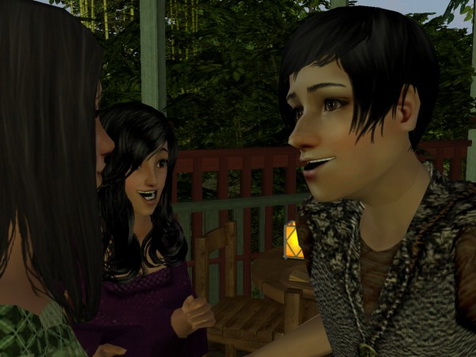
Gwynn gasped. No one called the Duke’s eldest daughter a liar. Nor was she!
“Tell him, Meggie!” she commanded. “It’s the truth!”
“Shut up about your stupid poem,” Margaret said. “Who are you?” she asked the boy. “Are you an elf?”
He snorted. “Do my ears look pointed to you?”
“Then why do you have elven clothes?” Emma asked. “And why do you talk like that?”
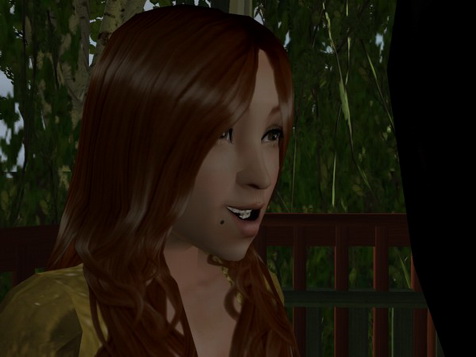
“I found the clothes,” he said. “And I do not know what’s wrong with your ears, but there is nothing wrong with the way I talk.”
“You have the same accent as Vash and Paul,” Margaret said.
He tossed back his head. “I do not know who they are. If I speak differently, it is because I come from far, far away. I am a wanderer,” he said proudly. “Just as in the true poem,” he added, with a sniff for Gwynn.
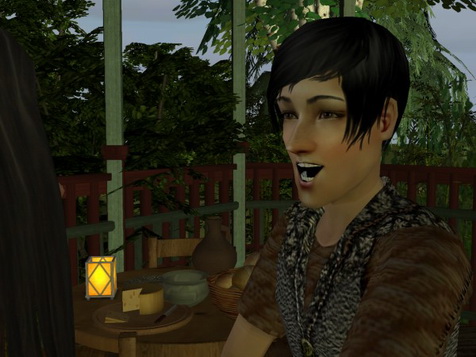
“What’s your name?” Emma asked. “Where is your home?”
“Are you from Scotland?” Margaret asked. “You certainly have a nose like a Scot.”
Gwynn had been too ruffled to notice the nose before that moment, but it was true: he had a nose rivaling Egelric’s or Malcolm’s in ugliness. His even bore the additional disfigurement of freckles.

“Yes!” he said. “I am a Scot-man, and I am going home.”
“You don’t speak like a Scot,” Gwynn muttered. “You even say ‘yes’ instead of ‘aye.’”
“How am I supposed to make you understand me if I do not?” he challenged.
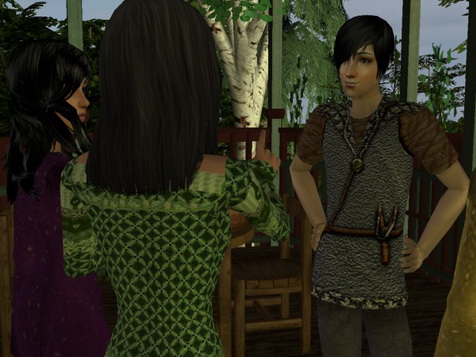
“Say something in Gaelic, then,” Gwynn demanded. “Liar!”
“Say something in Cockerel first!”
“Cockerel?” Gwynn gasped.
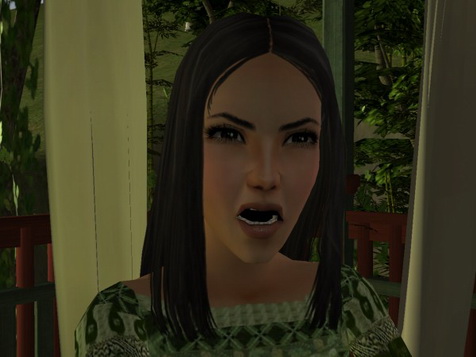
“I thought that’s what you were—prancing around down here, crowing and shaking your tail!”
Gwynn’s face, already pink with outrage, turned red with mortification. Shaking her tail! She needed her brother, her father, or any man to defend her from this knave, but she only had her snickering sister and the giggling younger Princess to hand.
“Are you Finn?” Margaret asked suspiciously.

Gwynn’s mouth dropped open.
“Who is Finn?” he sniffed. “My name is—Beowulf. And I’m sixteen.”
“How do you know Finn is not?” Emma countered.
“I don’t. But you asked.”
“No, I didn’t,” Emma said.
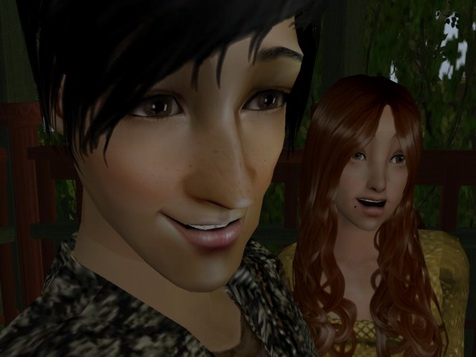
“I thought you did.” He nonchalantly brushed a bit of leaf from his sleeve.
Gwynn noticed that the boy himself was quite clean—his skin almost gleamed—but his clothes were filthy. Furthermore, though she was too elegant to have ever said the word aloud, Gwynn privately thought that he stunk. Of something worse than sweat and dirt.

“Finn is a boy who was stolen by the elves when he was a tiny baby,” Margaret said hurriedly. “He was the only child of his father and mother, and his father looked and looked for him, and his mother was so heart-broken she died. And his father is still looking for him to this day. He is the knight who lives in the castle across the lake. And you look just like him.”
The boy listened patiently to all of this. Then he said calmly, “I am not Finn. I am Beowulf. I come from far away. And my parents are both dead.”
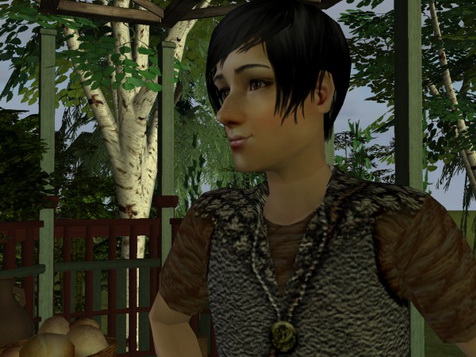
“Are you certain?” Gwynn asked. “Were your parents elves?”
“No!” He frowned in disgust as he did at everything she said. “Do I have pointed ears? I am a man, and I found these clothes, and I talk strangely because I’m a stranger, and I only wanted to tell you that I think you are a—what did you call her?” he asked Margaret.
“What?” Margaret asked.
“When she was making a mockery of that poem, you called her something.”
“A ninny?”

“A ninny is what you are!” he said to Gwynn. “I don’t know what it is, but I think you are one! A cockaninny!”
Margaret and Emma shrieked with laughter. The impudent boy, though he seemed startled by their reaction, even joined them with a chuckle.
Now Gwynn’s grimace was only meant to hold back tears. “Well, you’ve done it!” she howled. “So now I think you should go!”
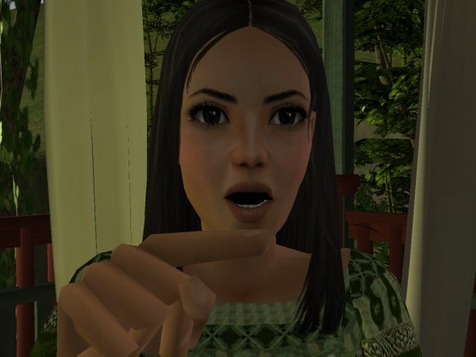
He turned his head away. Margaret seemed to think he was looking at the bread and cheese and honey arrayed on the table behind him, for she asked, “Are you hungry? We were about to have our snack.”
Gwynn pounded her clenched fists on her thighs in frustration. Her sister would not only allow her to be mocked, she would even invite the mocker to sit at table with them and share their afternoon meal!
“I’m not hungry!” she cried—almost a sob.
Beowulf turned back to her. “I shan’t stay, but I thank you.” He spoke to Gwynn, as if she had been the one to make the invitation. “If it won’t be missed, I should like to take a loaf with me. I haven’t had anything—any bread to eat since yesterday.”
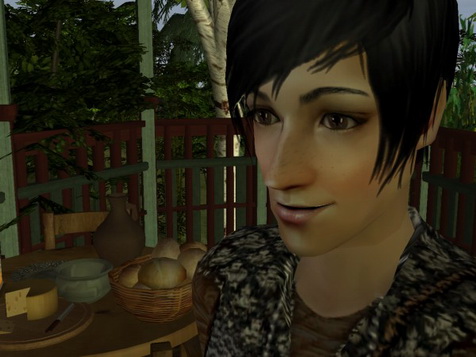
Gwynn looked him over again. Perhaps there was a sad story behind the dirty clothes after all. Perhaps he had no others. Perhaps he truly was a wanderer: “wretched and sorrowful, bereft of his homeland, far from noble kinsmen”…
“Take all you like,” Emma said. “But why don’t you stay here tonight? This is my sister’s castle. And Gwynn’s and Margaret’s brother’s. You would be welcome here, if you are journeying through our valley.”
“I cannot stay. I have far to go before I sleep. But I thank you for the invitation. I was only here to steal the bread you left behind, and I have been offered it instead.” He smiled. It was Egelric’s own sheepish smile.

“If you’re going across the lake,” Gwynn blurted, “you should go see Sir Egelric. At the castle. He… he’s a Scot, too.”
He turned to the table and began filling his sack with small loaves of sweet bread. “I am not.”
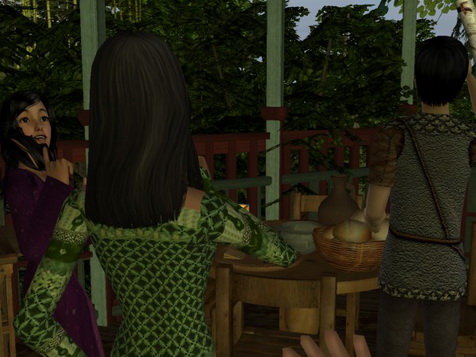
“You can probably fit a few in your stomach, too,” Margaret laughed.
“Don’t go too far!” Gwynn pleaded. What if he left the valley and never returned? “I wish you would stay another day and—and meet my father!”
“Your father the poet?” he laughed scornfully. “If you get your talent from him, it’s not worth the trouble.”

“Our father is a poet,” Margaret said. “He is also a Duke.”
“And my father was an elf, and also a King.” He tweaked his unpointed eartip. “Good day, girls. Thank you for the bread. It will assure you grateful thoughts from a distant wanderer a few times this evening, and perhaps tomorrow morning if I’m not greedy.”
He trotted down the steps and then broke into a run, up around the side of the bower and disappearing into the trees along the hillside.
The girls stared after him for a moment, stupefied, and then Margaret said, “Nom de Dieu! That was Finn! We must tell Egelric!”

“He said he was sixteen…” Gwynn said miserably.
The romantic reunion of her dreams could never be realized if this impudent, sneaking, stinky boy was truly Egelric’s son. She knew he could not have violet eyes, of course, but he need not have been so ugly, so rude…
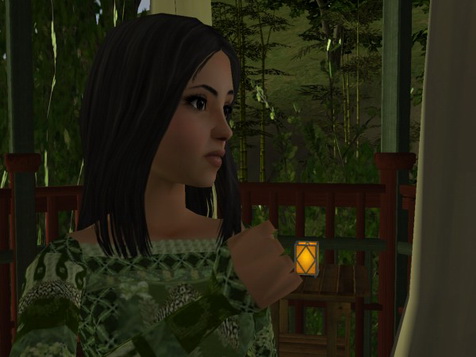
But perhaps he was a fitting son of Egelric after all.
“Sixteen my ankles!” Margaret cried. “Every word out of his mouth was a lie! What a ninny you are!”
“Cockaninny!” Emma cooed, and she and Margaret laughed.











I knew it!!! It is Finn, he's finally returned and it looks like Flann gave birth. You were right September would be a busy month.